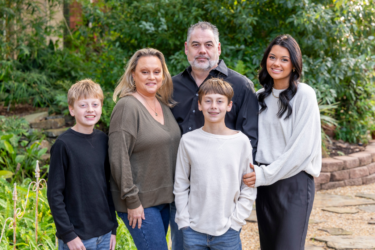Aubrey Martin is a fighter. Living with Rett syndrome and its associated global developmental delays is her everyday life. But in 2020, she faced a more urgent and critical health issue when she developed multisystem inflammatory syndrome in children, or MIS-C, the rare condition that impacts some kids with COVID-19.
“We were confused, didn’t know what was going on and couldn’t figure out the fever,” says Brit’ne Canezaro, Aubrey’s mom. “She was faced with a new obstacle of severe inflammation. She’s finally progressing enough that she’s not sleeping all day now. She pulls through every time.”
Aubrey had to be in the hospital while recovering from MIS-C but is home again and back in therapy at Pediatric Therapy Solutions and school as a second grader at Oak Grove Primary in Prairieville.
Surviving and thriving with a rare condition is something Aubrey knows how to do. Rett syndrome is a neurodevelopmental disorder caused by a rare mutation in the MECP2 gene and impacts about 1 in 10,000 girls born each year. Incurable, Rett syndrome affects brain development and takes away many abilities including coordination, speech, use of hands, and even ability to eat.
“Aubrey is considered atypical Rett,” Brit’ne says. “Hers is a less aggressive form. Aubrey is capable of using some of her words and walking.”
Aubrey is also able to ride a custom-made Freedom Concepts bike that she received from the McLindon Family Foundation in September. Aubrey’s school and therapists helped make the donation possible and ensured the bike was just right for her needs.
The shutdowns earlier in the pandemic and Aubrey’s COVID-19 diagnosis kept her from therapy for nearly three months, although she was able to do some virtual therapy, which helped.
“Our team is like our family,” Brit’ne says. “Everybody puts in so much work to help her and to be a part of her progress.”
Brit’ne began to realize developmental delays while Aubrey was a baby. “We went through years of working on trying to find out what was wrong,” Brit’ne says. Aubrey was diagnosed with Rett syndrome when she was five after getting genetic testing. “When she was diagnosed, I had no clue what it was.” Now, Brit’ne is an active advocate for her daughter and helps educate others about her condition. “We’re excited to tell the world about Rett syndrome.”
Because it’s such a rare disease, doctors who specialize in Rett syndrome are also scarce. The family must regularly travel to Texas Children’s Hospital in Houston to manage Aubrey’s care.
Life expectancy for people with Rett syndrome can be up to 40 years, according to the National Institutes of Health, and Brit’ne is mindful of the possibility that she may outlive Aubrey.
“We live every single day to the fullest and try to make the best of every single day because we’re not promised tomorrow just like everybody else,” Brit’ne says. “Yes, Aubrey has special needs, but I treat her like an everyday, normal child. And that’s how we’re going to live life. Just because she’s different, we’re not going to put a limit on her.” ■





